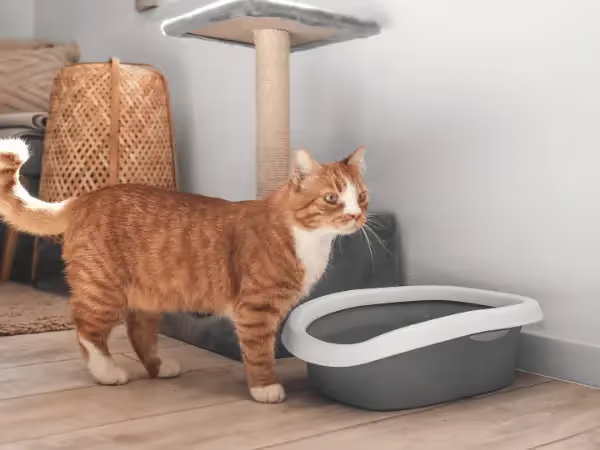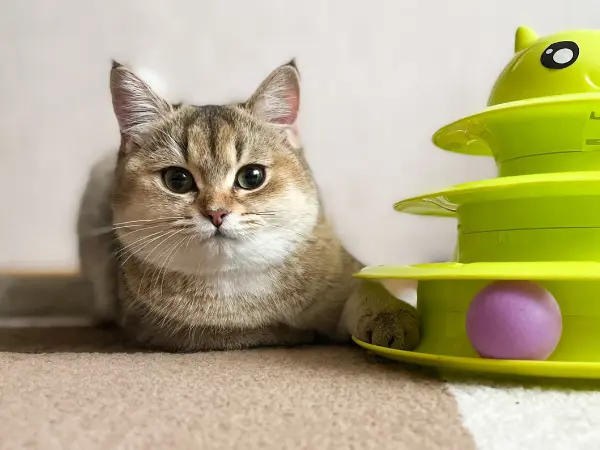A cat peeing outside the litter box is a common issue that pet parents often face, and it can be frustrating. Nonetheless, this behavior in cats can signal underlying behavioral issues or medical conditions that pet parents can address for a more harmonious home environment.
In this complete guide by Sploot Veterinary Care, we go over the most common conditions and issues that can lead to a cat peeing outside litter box or litter box aversion, along with useful tips for each possible cause.

I. Medical Issues That Can Interfere with Litter Box Use
Certain medical issues can cause a cat to pee outside their litter box. These medical issues may lead to difficulty urinating, painful urination, mobility issues, and so on. All of which can distract or discourage a cat from their usual litter box behaviors.
Here are the top feline medical issues or conditions that are linked to a cat peeing outside litter box:
1. Urinary Tract Infection in Cats & Bladder Stones
- Reasons for cat peeing outside litter box: pain, incontinence, frequent but small amounts of urine
- Prevalence: common
If your cat has started peeing outside the litter box (or has no litter box pee at all), it could be a sign that they are suffering from a feline UTI (urinary tract infection) or bladder stones.
UTI in cats is defined as a bacterial infection affecting the urethra and/or bladder (lower UTI) — OR the kidneys and/or ureters (upper UTI). Meanwhile, bladder stones in cats are solid calculi formations inside the bladder due to certain minerals combining.
Cats with UTI and/or bladder stones may pee outside the litter box due to the following reasons:
- Pain and discomfort —Generally, cats feel pain and discomfort when they have UTI; this can cause them to be distracted from their usual habits and some may associate their litter box with pain.
- Incontinence in Cats & Frequent Urination — feline UTI can cause urinary incontinence, preventing the cat from holding urine properly. Cats with UTI or bladder stones may also need to frequently urinate in small amounts.
Note: In some cases, feline UTI and bladder stones can lead to a lack of urination (anuria). This, along with the symptoms mentioned above, requires urgent vet care.

2. Feline Idiopathic Cystitis (FIC)
- Reasons for cat peeing outside litter box: pain, incontinence
- Prevalence: common in both young and middle-aged cats
Feline Idiopathic Cystitis (FIC) is a non-infectious inflammation of the urinary bladder with an unknown cause. It is most common in young and middle-aged cats and commonly results in painful urination, frequent urination, and potentially, incontinence.
Because of these symptoms, a cat may pee outside their litter box due to an association with the pain or because they are not able to control their pee as effectively.
If you suspect that your cat has FIC, we recommend reaching out to a trusted veterinarian.
3. Kidney Disease
- Reasons for cat peeing outside litter box: incontinence
- Prevalence: more common in older cats but kittens can be born with it
Kidney disease in cats is characterized by impaired function and/or progressive loss of function in the kidneys. Kidney disease can be classified as acute (sudden onset) or chronic (developed over months and years.)
There are various causes of kidney disease including infections, blockages, poisons, and so on. There are also a variety of symptoms that point to kidney disease such as increased frequency of UTIs, vomiting, diarrhea, bloody/cloudy urine, increased thirst, and so on.
Kidney disease can lead to a cat peeing outside litter box because this condition can cause frequent urination. In some cases, cats may be unable to hold their pee appropriately. It is best to consult a vet immediately if you observe any of the symptoms mentioned here.
4. Neoplasia (Bladder or Urethral Tumors)
- Reasons for cat peeing outside litter box: incontinence
- Prevalence: Somewhat rare
Neoplasia on the bladder or urethra refers to the abnormal growth of cells (tumors) in the bladder or urethra of the cat. These tumors can cause difficult urination in small amounts as well as bloody urine.
In addition, incontinence is also a possible symptom. Because some cats experience incontinence with this condition, this may lead to peeing outside the litter box.
Neoplasia has plenty of shared symptoms with other problems in the urinary system. This is why it’s always important to consult a vet when you see any of the abnormal symptoms mentioned here. An experienced vet will be able to provide an accurate diagnosis.
5. Arthritis, Joint Problems, & Mobility Issues
- Reasons for cat peeing outside litter box: pain (joints)
- Prevalence: Common in older cats
Litter box aversion in cats can often be linked to arthritis, joint problems, and other mobility issues. There are two main things to consider: accessibility and comfortable usage.
a. Litter Box Accessibility Issues
As cats get older, they can develop arthritis or other joint conditions that make it painful for them to move, jump, or climb. If the litter box is situated in a location that requires significant effort to access (e.g. upstairs or in a high-sided box), a cat with joint pain may find it too difficult or painful to reach. This discomfort can lead to the cat peeing outside litter box.
b. Comfortable Usage of Litter Box
Aside from litter box accessibility, there’s also the comfort aspect. Cats with mobility issues might struggle with balance and coordination, making it challenging to position themselves comfortably in the litter box.
If the litter box is too small for comfortable use, a cat with arthritis or other mobility impairments might have trouble maneuvering inside it — thus leading to accidents outside the litter box.
Note: If you suspect that your cat has joint problems and other mobility issues, consult a vet. A trusted veterinarian can accurately diagnose your cat’s joint problem and provide the best strategy for treatment. This can include litter box recommendations.

II. Behavioral Issues Linked to Litter Box Aversion in Cats
Aside from medical issues, behavioral issues and problems concerning mental well-being in cats can also be reasons for a cat peeing outside litter box. Stress, anxiety, marking behaviors, and boredom are all possible reasons for inappropriate urination.
6. Stress & Anxiety
Stress and anxiety in cats can manifest in various behaviors such as excessive grooming, aggression, vomiting, increased meowing or vocalization, loss of appetite, and more. Another manifestation of stress and anxiety is litter box aversion or litter box issues.
In some cases, stress and anxiety will cause cats to hide and refuse to come out into the open to use their litter box. This can lead to inappropriate urination in the place where they are hiding.
Granted, some changes may take getting used to, such as moving to a new house or introducing new pets. It’s important to keep track of how your cat is coping, ensure their safety, and prevent any chances of running away or escaping.
In addition, get support from your vet. They would be best suited to recommend personalized solutions for your cat’s stress and anxiety — while also ruling out other medical issues that may be causing litter box issues.
Note: FIC (Feline Idiopathic Cystitis), one of the potential medical reasons behind a cat peeing outside litter box has no known definitive cause. However, stress can play a role.
7. Marking & Spraying
Marking and spraying are both behaviors through which cats communicate using scent. Both of these can involve cat peeing outside litter box, but in different ways:
- Marking involves depositing small amounts of urine or feces on horizontal or vertical surfaces to establish territory, convey social status, or alleviate stress.
- Spraying, on the other hand, involves small amounts of urine directed toward vertical surfaces while the cat backs up with its tail raised. This behavior is typically associated with territoriality, mating signals, or stress responses.
Marking and spraying are more common in cats that are stressed, anxious, or intact (i.e. NOT spayed or neutered). Talk to a trusted vet like Sploot to zero in on the possible cause and weigh the potential benefits of getting your cat spayed or neutered.
8. Boredom
Though uncommon, boredom can also be a reason for a cat peeing outside litter box. If all other reasons have been ruled out, it’s possible that your cat may be bored and not having enough enrichment.
→ Learn more - How to Create an Enriching Environment to Keep Your Cat Happy

III. Other Issues Linked to Cat Peeing Outside Litter Box
In some cases, medical and behavioral issues are NOT causing litter box aversion. Sometimes, a cat can be perfectly healthy and content but can still pee outside the litter box due to issues with the upkeep, placement, or number of litter boxes in the home.
9. Dirty Litter Box
A dirty litter box can lead to a cat peeing outside litter box due to discomfort in using a soiled area. Cats are naturally clean animals and may refuse to use a litter box that is not cleaned regularly. The buildup of urine and feces can create an unpleasant environment, causing the cat to seek cleaner spots elsewhere in the home.
We recommend scooping or spot-cleaning the litter box daily and deep cleaning every 2 - 4 weeks.
10. Location, Location, Location
Badly located litter boxes can contribute to cats peeing outside litter box. Placing the box in noisy, high-traffic areas, or in places that are difficult for the cat to access (especially for elderly or arthritic cats), can deter them from using it. Cats prefer quiet, private locations for elimination, away from food and water sources. Remember to place the litter box in a calm, private place to prevent litter box aversion.
11. Too Few Litter Boxes
Insufficient litter boxes for multiple cats in a household can lead to competition and stress. Cats may feel crowded or intimidated, leading to inappropriate elimination. Each cat ideally needs its own litter box plus an extra.
The litter boxes are best placed in separate, accessible locations to prevent territorial conflicts and ensure all cats have appropriate options for elimination.
12. Litter Aversion: Scent, Texture, & Irritation
Cats can develop litter aversion due to issues with the scent, texture, or irritants present in the litter. Strong scents from perfumed litter may overwhelm a cat's sensitive sense of smell, discouraging its use.
Similarly, some cats may find certain litter textures uncomfortable or irritating to their paws (e.g. crystalline silica litter for some). This leads them to seek alternative surfaces for elimination. Dusty litter can also be problematic, causing respiratory discomfort for some cats and, possibly, their pet parents as well.
Addressing litter aversion involves choosing unscented, dust-free litters with textures that appeal to the cat, ensuring a comfortable and inviting environment that encourages proper litter box use.

Final Thoughts on Cat Peeing Outside Litter Box
As we’ve discussed, there are many reasons why a cat would urinate outside of their litter box. If you have further questions or concerns about your feline friend, Sploot Vets is here to help!
Sploot Veterinary Care is a vet clinics in Denver, Chicago and Colorado Springs that offers comprehensive care, from primary /preventative to urgent to emergency vet care services. We are available for extended hours every day, 365 days a year.
Our clinics are designed to provide the best experience, with fear-free methods, private exam rooms available, and free treats from the treat bar.
Book an appointment online or through the Sploot Vets app, your mobile tool for hassle-free pet parenting. In case you’re concerned about urgent symptoms like anuria or bloody urine, call our team for urgent or emergency vet services.
Till next time, we’re with you every pounce of the way!






